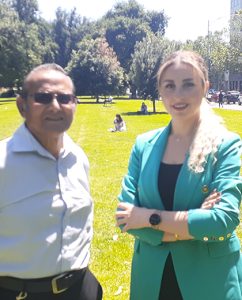Migrant, refugee agency AMES Australia celebrates 70 years of nation building
This month, leading settlement agency AMES Australia marks 70 years of supporting migrants and refugees settle successfully in Australia.
From humble beginnings teaching English to new arrivals in makeshift Nissen Huts at Bonegilla, AMES Australia has grown into one of Australia’s leading settlement agencies, delivering services to more than 30,000 clients and touching the lives of more than 250,000 people from multicultural communities each year.
Formally established in 1951, the organisation’s original mission of teaching English to new migrants has grown to include humanitarian settlement, employment services and community development programs. The first AMES services were delivered this week in 1952
AMES Australia was an integral part of the birth of multiculturalism, a term that was new in the 1970s but which now is accepted as an accurate description of the cultural and ethnic diversity of contemporary Australia.
The organisation’s programs are aimed at fostering a sense of belonging among our clients and they recognise that social and economic participation are key ingredients in maintaining social cohesion.
 AMES Australia’s network of more than 600 staff and 500 volunteers – 43 per cent of whom were born overseas and collectively speak more than 90 languages – work to create community links between our clients and the broader society.
AMES Australia’s network of more than 600 staff and 500 volunteers – 43 per cent of whom were born overseas and collectively speak more than 90 languages – work to create community links between our clients and the broader society.
In supporting nearly four million people new to these shores on their settlement journeys AMES is proud to have contributed to the transformation of Australia’s economic, cultural and social life.
Fifty years separates the journeys of Hector de Santos and Jamila Alarkan to Australia. But both have been supported by AMES on their settlement journeys.
Jamila was studying engineering in Syria in 2012 when war broke out cutting her off from her university in Aleppo.
Refusing to give up, she found a convent in the battle-scarred city that housed nuns and other students – but which had no power or running water.
“Missiles were falling around but I managed to graduate,” Jamila said.
“I was only able to see by candlelight to study, but I could see a future for myself,” she said.
After completing her studies, she fled her homeland arriving in Melbourne, where AMES supported here to rebuild her life. She is now working as an engineer delivering agricultural projects in Victoria for services giant Worley.
She says AMES helped her improve her English and connect with the engineering industry, which was vital in re-establishing her career.
Hector de Santos fled Burma in the 1960s with his wife Wendy, says AMES services are critical for new arrivals ton Australia,
He is now one of 50 AMES volunteers helping migrants and refugees navigate a new society.
“AMES is very, very important. Having been through the refugee journey myself. I know how difficult it can be. When we left Burma, we had to go through Thailand, where not many people spoke English,’ Mr de Santos said.
A statutory authority of the Victorian Government, AMES manages a range of federal and state government programs under its vision of ‘full participation for all in a cohesive and diverse society’.
Among the organisation’s programs are the management of Melbourne’s vibrant Multicultural Hub – a vital facility for the city’s diverse communities – as well as social enterprises that provide training and work experience, cultural and artistic events and youth-based initiatives.
AMES has built a range of partnerships with universities, TAFEs, migrant resource centres, health professionals, real estate and community organisations aimed at supporting migrants and refugees achieve their aspirations around life in Australia.
A key service is supporting refugees, who have fled conflicts or persecution around the globe, to start new lives in Australia.
AMES CEO Cath Scarth said the organisation also works to create community links between its clients and the broader society.
“In 1951 our organisation was created to help in the great nation building experiment that has been Australia’s immigration program. And this week in 1952 we began delivering our first settlement service – teaching English to new migrants at the Bonegilla migrant centre,” Ms Scarth said.
“Our organisation’s innovative and flexible approach has benefitted millions of individuals and families and helped them to become migrant ‘success stories’,” Ms Scarth said.
“Over the years AMES Australia has quietly become part of the fabric of Victoria and Australia. So many migrant families in Victoria have fond stories about the support they received from AMES,” she said.
“Successive waves of migrants and refugees – from the Europeans who came after the war to the Vietnamese in the 1970s and Iraqis, Syrians and Afghans more recently – have been supported by our organisation to establish themselves, and in turn contribute to the rich cultural tapestry that is Australia.
“Over the past six months we have supported the Afghans who were evacuated so dramatically from Kabul last August. Over just fifteen days around the end of September we welcomed almost 2000 Afghans – almost all of them in need of housing, food, clothing, personal necessities, medical and mental health care, COVID vaccinations and reassurance that things would be OK.
“And during the COVID-19 pandemic, AMES Australia has been working with newly arrived refugees and migrants as well as Victoria’s diverse communities to make sure they understand the latest health advice and rules and that they are able to access critical services.
“AMES Australia staff are rightfully proud of the role they have played in supporting newcomers to settle through harnessing their innate strengths and resilience,” Ms Scarth said.












